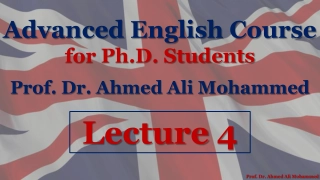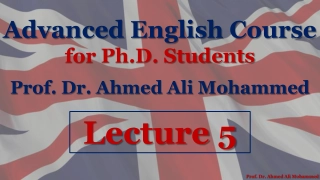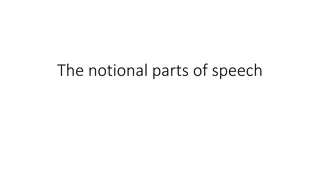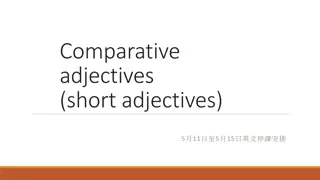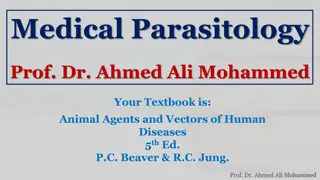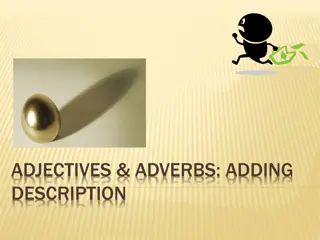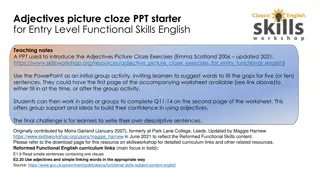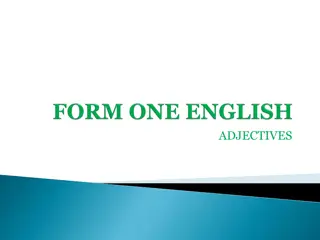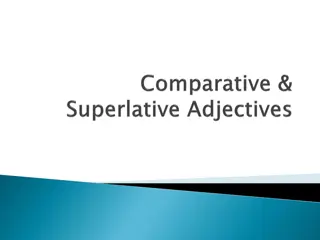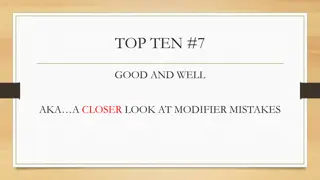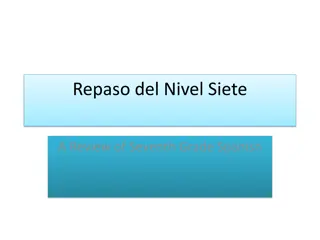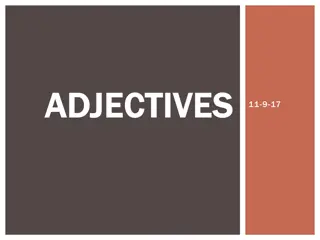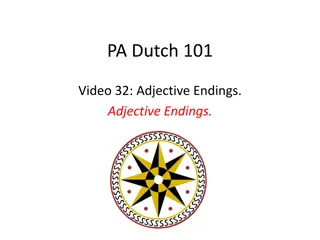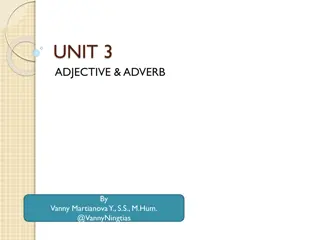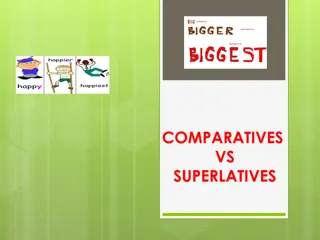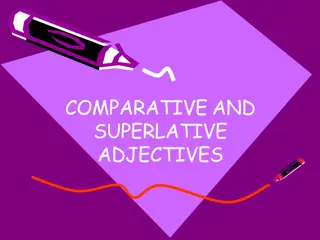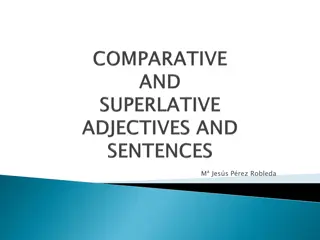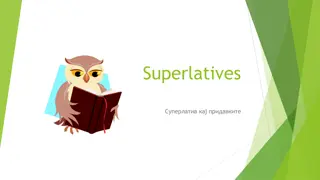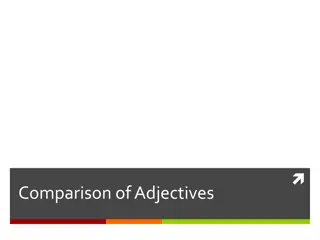Adjectives in Ph.D. English Course by Prof. Dr. Ahmed Ali Mohammed
Explore the fundamental concepts of adjectives in an advanced English course for Ph.D. students, led by Prof. Dr. Ahmed Ali Mohammed. Learn about the various categories of adjectives such as color, size, shape, feelings, quantity, qualities, appearance, and condition. Enhance your understanding of how adjectives modify nouns and pronouns to provide detailed descriptions. Dive into the nuances of adjectives through engaging lectures and examples provided.
Download Presentation

Please find below an Image/Link to download the presentation.
The content on the website is provided AS IS for your information and personal use only. It may not be sold, licensed, or shared on other websites without obtaining consent from the author. Download presentation by click this link. If you encounter any issues during the download, it is possible that the publisher has removed the file from their server.
E N D
Presentation Transcript
Advanced English Course for Ph.D. Students Prof. Dr. Ahmed Ali Mohammed Lecture 3 Prof. Dr. Ahmed Ali Mohammed
Lecture 3 Adjectives, Nouns and Verbs Prof. Dr. Ahmed Ali Mohammed
What are adjectives? An adjective modifies a noun or a pronoun by describing, identifying, or quantifying words. An adjective often precedes the noun or the pronoun that it modifies. Ex: big, boring, purple, quick, obvious, etc. Categories of adjectives The following are the fourteen major categories of meaning that are expressed with English adjectives. A few examples are listed for each category, but there are several more possibilities. 1. Color blue, red, green, brown, yellow, black, white, purple, pink, orange, etc... Prof. Dr. Ahmed Ali Mohammed
2. Size big, huge, immense, enormous, massive, vast, large, wide, small, little, tiny, high, long, tall, low, short, same as, etc... 3. Shape round (a ball), circle (a door knob), triangular, rectangular (a flag), square (a cake), oval (an egg), broad, curved, flat, etc... 4. Feelings: happy, glad, cheerful, pleased, satisfied, delighted, sad, broken, dark, depressed, disappointed, disconsolate, discouraged, displeased, dissatisfied, distressed, down, angry, excited, embarrassed, frightened, scared, etc... Prof. Dr. Ahmed Ali Mohammed
5. Quantity one, two, three, ... first, second, third, ... abundant, empty, heavy, light, numerous, significant, insignificant etc... 6. Qualities and appearance: good, excellent, brilliant, fantastic, bad, terrible, awesome, awful, nice, beautiful, pretty, gorgeous, cute, glamorous, elegant, good- looking, handsome, ugly, right, wrong, funny, amusing, entertaining, light, heavy, fat, thin, slim, clean, dirty, filthy, straight, noisy, quiet, still, calm, powerful, nutritious, adorable, adventurous, Prof. Dr. Ahmed Ali Mohammed
aggressive, attractive, bloody, blushing, colorful, exciting, graceful, dull, homely, plain, precious, sparkling, fragile, weak, strong, doubtful, confused, puzzled, cautious, careful, concerned, innocent, guilty, crazy, silly, stupid, foolish, clumsy, intelligent, clever, shy, rich, poor, wild, courageous, brave, helpful, helpless, unhelpful, etc... 7. Condition important, principal, famous, notorious, fictitious, real, true, false, imaginary, alive, dead, odd, weird, unusual, strange, outstanding, impossible, improbable, easy, difficult, closed, open, etc... Prof. Dr. Ahmed Ali Mohammed
8. Weather and temperature cold, warm, hot, cool, rainy, windy, snowy, foggy, sunny, cloudy, stormy, frozen, etc... 9. Time: late, early, delayed, premature, modern, traditional, old-fashioned, young, old, new, slow, swift, quick, rapid, brief, short, long, etc... 10. Age old, ancient, aged, elderly, ageless, overage, young, juvenile, adolescent, teenage, underage, youthful, etc... 11. Nationality and Origin American, Mexican, British, French, German, African, Asian, etc... Prof. Dr. Ahmed Ali Mohammed
12. Material wooden, woollen, cottony, fibrous, metallic, bronze, etc... 13. Purpose (These adjectives usually end with ing ) drying machine, cooling system, evaporating system, separating technique, time-saving, sleeping bag, frying pan, driving licence, etc... 14. Sound loud, noisy, quiet, screeching, silent, soft, voiceless, etc... If you have a collection of them arrange them as: OSASH.COM Opinion, Size, Age, Shape, Color, Origin, Material Prof. Dr. Ahmed Ali Mohammed
To read and write academic texts effectively, you need to be familiar with the rather formal vocabulary widely used in this area: Prof. Dr. Ahmed Ali Mohammed
Academic adjectives The following adjectives are best understood and used, with their opposites: Prof. Dr. Ahmed Ali Mohammed
Formality in verbs Academic writing tends to use rather formal verbs to express the writing meaning accurately. Look at these examples: Prof. Dr. Ahmed Ali Mohammed
Prefixes and suffixes Prefixes change or give the meaning. Suffixes show the meaning or the word class (e.g. noun, verb). Ex: Unsustainable , is an example of a word containing a prefix and suffix. Negative prefixes such as un-/ in-/ mis- and dis- often give adjectives and verbs a negative meaning: unclear, incapable, misunderstanding, disagree etc. Prof. Dr. Ahmed Ali Mohammed
auto: by itself co : together ex : (i) previous (ii) outside macro: large micro : small multi : many, over, too much Over : extra, more post : later re : again sub : below under : (i) below (ii) not enough A prefixes meanings, which usually means before , prehistory, premature. The following examples of prefixes: wide variety of define pre- e.g. e.g. are Prof. Dr. Ahmed Ali Mohammed
Suffixes Some suffixes like -ion/ -ive or -ly help the reader find the word class, e.g. noun, verb or adjective. Other suffixes add to meaning, e.g. -ful or -less after an adjective have a positive or negative effect. Ex: thoughtful/ careless. Prof. Dr. Ahmed Ali Mohammed
ThankYouFor Your Listening Prof. Dr. Ahmed Ali Mohammed
See You Next Lecture Prof. Dr. Ahmed Ali Mohammed





